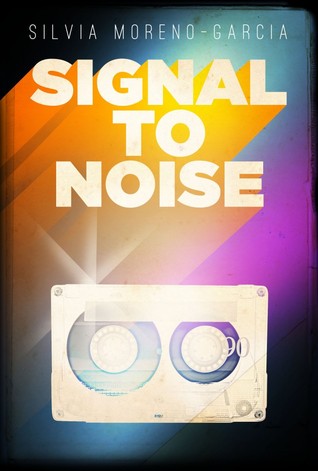Signal to Noise is the novel you're looking for if you're getting tired of same-old YA fantasy, if witches make you yawn, if spunky, wise-beyond-their-years adolescent protagonists are driving you crazy, if you'd just like to see a little reality in characters' interactions. And if you'd love, for once, if something was set somewhere other than England or North America, please, pretty please with a cherry on top. (It also helps if you secretly think the 80's were kind of cool, and if you're a bit of a music nerd.)
How about Mexico City for a setting? And magic that uses David Bowie* songs. And a character who embodies all the confusion, the mistakes, the self-centeredness, the pettiness, the loneliness and longing of adolescence. Meche grabbed me from the start, sitting in an airplane, returning against her will to the city of her childhood. Something bad happened back then, we don't know what; we only know she successfully escaped and has avoided dealing with any of it for twenty years. Now she's back in Mexico City for her father's funeral, and as she re-encounters the family and friends she left behind, we relive with her in flashback the series of magical discoveries and mistakes that sent her running away.
The dual time-frame narration works particularly well for this story. Meche in the present has no magic, so when Meche in the past discovers how to cast spells by playing the right record with the right intention, there is an immediate tension built up: why did she lose or give up her power? We meet her friends in the past, and then we meet them in the present, and we wonder how they became so estranged. We're compelled through the unfolding of the stories, past and present, by the burning question: what went wrong?
Meche's magical development is much more realistic than in most YA fantasies. Meche and her friends don't use their magic to save the world; not even to save themselves—because, really, what adolescent would even know how to do that? They do exactly the things that—let's be honest here—your teenage self would do if you could cast spells. You would want to be better-looking, more fashionable, more popular. And the spells work about as well as you'd expect them to.
This is not the novel for you if you want detailed explanations of magical workings; it's not really about the magic. It's about the relationships, and it is beautifully, agonizingly detailed about the communications and miscommunications, the emotions expressed and repressed, the needs met and denied, that form the intricate, ever-changing web of human interactions. We love and hate a person equally, sometimes at the same time. We never say what we mean but we desperately want to be understood. The magic is really a metaphor for the power we have over the people in our lives, power we use without knowing, or without knowing the consequences. We watch Meche stumble toward her doom, wincing at every choice she makes while understanding exactly why she makes it. She is one of the most unlikeable characters I have ever felt such great affection for.
I love all the characters, but I particularly love Sebastian, his awkwardness, his honesty, his little kindnesses. His relationship with Meche is so perfectly drawn; they make you cry, they make you want to shake them. I also really liked Meche's grandmother and her role in the story.
This is a novel that keeps you thinking, that makes you want to go back into it and reread scenes, knowing what you find out later. It also makes you listen to a lot of music you might never otherwise encounter! And lest my review makes it sound overly depressing and tragic, without spoilers all I can say is, it's not. It's not too late for Meche to fix the mistakes of her past, and it's extremely satisfying when she finally clues into how she can do that.
The Book Smugglers did a great review of Signal to Noise on Kirkus, and Ana points out the same difficulty I'm having: how to categorize this book. The plot revolves** around three teenage friends learning how to do magic by playing records, but it feels more like a realistic novel than a fantasy. It might not count as YA because Meche is in her mid-thirties when she arrives in Mexico City, although, because she hasn't been back since she was a teenager, she is immediately thrown back into the relationships and attitudes of her adolescence so she doesn't seem like a 30-year-old. But on the other (other?) hand, teenagers may not enjoy reading such a realistic portrayal of their flaws!
Let's call it insightful YA literary fantasy. And that's a category I'd happily read more of.
Full disclosure: I know Silvia. But I bought the book with my own money, and I never promised I'd review it: if I hadn't liked it, I would never have mentioned it again. (And she would never ask me about it, because that would be just awkward, right?) Good thing I liked it!
For more Canadian books of every category, visit John Mutford's blog and see what the other Canadian Challenge participants have been reading.
Cross-posted on Goodreads.
*Not to mention a bunch of other artists I'd never heard of but when I YouTubed them I recognized their songs. Prokol Harem's "Whiter Shade of Pale," for example (it was in the movie Oblivion, too!):
And there's a playlist of all the songs mentioned! Handy to have while you're reading.
**No pun intended.


Sounds like a good read. By chance, I am just back from Mexico and missed out on buying any books while there.
ReplyDelete